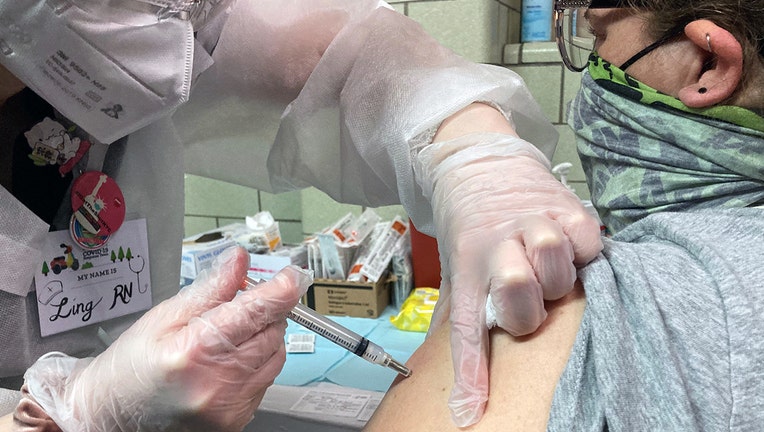2nd COVID vaccine booster benefits the most vulnerable

A nurse administers a COVID-19 vaccine shot to a woman at a vaccination site in New York City. (FOX 5 NY Photo)
An expert group convened by the World Health Organization says there may be some benefit in giving a second booster dose of COVID-19 vaccine to the most vulnerable people amid the continuing global spread of omicron and its subvariants.
In a statement issued on Tuesday, the United Nations health agency said there was "a growing body of evidence regarding the value of an additional booster dose" for groups including health workers, people aged over 60 and those with weak immune systems.
The WHO said its expert group had assessed the limited data from seven studies for second booster doses of messenger RNA vaccines, saying there wasn't enough information proving their effectiveness in younger, healthy people.
"Data on the usefulness of these additional booster doses is sparse and especially limited on the duration of further protection. Data on additional booster doses as of May 2022 only exists for the mRNA vaccines, and not for other vaccine platforms," the WHO said.
The agency acknowledged that offering people a second booster dose could be challenging in certain parts of the world.
"Administering an additional booster dose likely comes with considerable programmatic challenges in terms of vaccine delivery in many settings. The financial and opportunity cost of such [programs] must also be carefully weighed against the limited incremental benefit of an additional booster dose," the WHO said. "In those most at risk for severe disease or death (i.e. adults above the age of 60 years, or those who are not able to mount a full immune response), the additional benefit of an additional booster dose of mRNA vaccine might be warranted."
Related Coverage
- FDA approves Pfizer COVID-19 booster for children ages 5 to 11
- Can you get long COVID after an infection with omicron?
- Can children suffer long-term symptoms after infection?
While many rich countries have vaccinated more than 70% of their populations, fewer than 16% of people in poorer countries have been immunized.
In 2021, the WHO repeatedly criticized rich countries for offering booster doses and called for a moratorium on the practice, saying boosters were unnecessary for healthy people. The agency reversed its advice late last year amid the spread of the hugely infectious omicron variant, after dozens of countries began offering booster doses.
Some health experts have warned that countries embarking on additional booster campaigns could deplete the world's supply of COVID-19 vaccines before the most vulnerable people in developing countries have been offered a single shot.
The U.S. Food and Drug Administration recommended in March that Americans 50 and over be eligible for a second COVID-19 booster shot while the European Medicines Agency has only cleared second booster doses for those 80 and over.
Amid the continuing spread of omicron and its subvariants, the WHO and others have continued to call for accelerated vaccination campaigns.
"What we are seeing is that people who are vaccinated have a much reduced risk of developing severe disease and death," said WHO's COVID-19 lead Maria Van Kerkhove, warning against the false perception that omicron is mild. "We have solutions for this because we have vaccines," she said.
The WHO also said countries may want to consider the correlation between case counts and the cold winter season.
"While seasonality is not yet fully established for SARS-COV-2, evidence from the past two years support the notion of more substantial transmission during the winter season," the WHO stated. "Therefore, for countries with either a Northern or Southern Hemisphere winter season, plans for catch-up to improve primary series coverage and boosting for those at highest risk, campaigns should take seasonality into account."
With The Associated Press.

